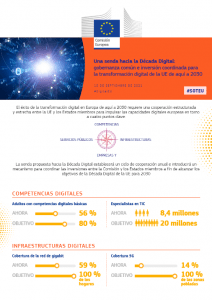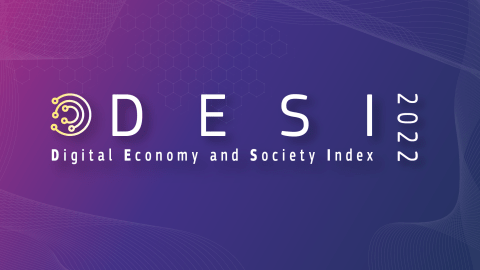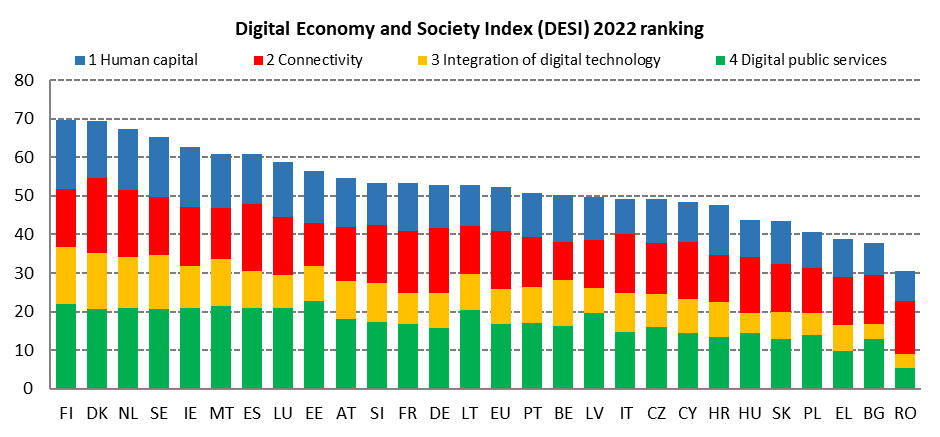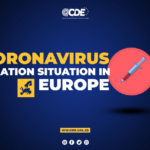The European Commission published the results of the 2022 Digital Economy and Society Index (DESI), which tracks the progress made in EU Member States in digital.
During the Covid pandemic, Member States have been advancing in their digitalisation efforts but still struggle to close the gaps in digital skills, the digital transformation of SMEs, and the roll-out of advanced 5G networks. The Recovery and Resilience Facility, with about €127 billion dedicated to reforms and investments in the area of digital, offers an unprecedented opportunity to accelerate the digital transformation, which the EU and its Member States cannot afford to miss.
Spain ranks 7th in 2022 edition
Spain ranks 7th out of 27 EU Member States in the 2022 edition of the Digital Economy and Society Index (DESI). The country is making relative progress and improving its performance compared to previous years, especially in terms of digital technology integration (ranked #11, five places better than in 2021), as well as in public digital services (ranked #5 compared to #7 in 2021) and in terms of human capital (ranked #10 compared to #12). Spain is one of the EU leaders in terms of connectivity and ranks #3 for the second consecutive year.

Overall assessment of EU countries
The findings show that while most of the Member States are making progress in their digital transformation, the adoption of key digital technologies by businesses, such as Artificial Intelligence (AI) and Big Data remains low. Efforts need to be stepped up to ensure the full deployment of connectivity infrastructure (notably 5G) that is required for highly innovative services and applications. Digital skills is another important area where Member States need to make bigger progress.
The Commission’s proposal on the Path to the Digital Decade, agreed upon by the European Parliament and EU Member States, will facilitate deeper collaboration between Member States and the EU to advance in all dimensions covered by the DESI. It provides a framework for Member States to undertake joint commitments and establish multi-country projects that will reinforce their collective strength and resilience in the global context.
Finland, Denmark, the Netherlands and Sweden remain the EU frontrunners. However, even they are faced with gaps in key areas: the uptake of advanced digital technologies such as AI and Big Data, remains below 30% and very far from the 2030 Digital Decade target of 75%; the widespread skill shortages, which are slowing down overall progress and lead to digital exclusion.

Programa «Itinerario hacia la Década Digital»: el Consejo y el Parlamento Europeo alcanzan un acuerdo provisional |
There is an overall positive convergence trend: the EU continues to improve its level of digitalisation, and Member States that started from lower levels are gradually catching up, by growing at a faster rate. In particular, Italy, Poland and Greece substantially improved their DESI scores over the past five years, implementing sustained investments with a reinforced political focus on digital, also supported by European funding.
As digital tools become an integral part of everyday life and participation in society, people without appropriate digital skills risk being left behind. Only 54% of Europeans aged between 16 -74 have at least basic digital skills. The target of the Digital Decade is at least 80% by 2030. In addition, although 500.000 ICT specialists entered the labour market between 2020 and 2021, the EU’s 9 million ICT specialists fall far short of the EU target of 20 million specialists by 2030 and are not enough to bridge the skills shortages businesses currently face. During 2020, more than half of the EU enterprises (55%) reported difficulties in filling ICT specialist vacancies. These shortages represent a significant obstacle for the recovery and competitiveness of EU enterprises. Lack of specialised skills is also holding the EU back in its efforts to achieve the Green Deal targets. Massive efforts are therefore required for the reskilling and upskilling of the workforce.
Regarding the uptake of key technologies, during the Covid pandemic, businesses have pushed the use of digital solutions. The use of cloud computing, for example, reached 34%. However, AI and Big Data use by business stand only at 8% and 14% respectively (target 75% by 2030). These key technologies bring a huge potential for significant innovation and efficiency gains, particularly among SMEs. For their part, only 55% of EU SMEs have at least a basic level in digitalisation (target: at least 90% by 2030), indicating that almost half of SMEs are not availing of the opportunities created by digital. The Commission has today published a survey of enterprises on the data economy.

Una senda hacia la Década Digital. Gobernanza común e inversión coordinada para la transformación digital de la UE de aquí a 2030 : 15 de septiembre de 2021 |
In 2021, Gigabit connectivity increased further in Europe. The coverage of networks connecting buildings with fibre reached 50% of households, driving overall fixed very high capacity network coverage up to 70% (100% target by 2030). 5G coverage also went up last year to 66% of populated areas in the EU. Nonetheless, spectrum assignment, an important precondition for the commercial launch of 5G, is still not complete: only 56% of the total 5G harmonized spectrum has been assigned, in the vast majority of Member States (Estonia and Poland are the exceptions). Moreover, some of the very high coverage figures rely on spectrum sharing of 4G frequencies or low band 5G spectrum, which does not yet allow for the full deployment of advanced applications. Closing these gaps is essential to unleash the potential of 5G and enable new services with a high economic and societal value, such as connected and automated mobility, advanced manufacturing, smart energy systems or eHealth. The Commission has also today published studies on mobile and fixed broadband prices in Europe in 2021 and broadband coverage in Europe.
The online provision of key public services is widespread in most of the EU Member States. Ahead of the introduction of a European Digital Identity and Wallet, 25 Member States have at least one eID scheme in place, but only 18 of them have one or more eID schemes notified under the eIDAS Regulation, which is a key enabler for secure digital cross-border transactions.
The EU has put on the table significant resources to support the digital transformation. €127 billion are dedicated to digital related reforms and investments in the 25 national Recovery and Resilience Plans that have so far been approved by the Council. This an unprecedented opportunity to accelerate digitalisation, increase the Union’s resilience and reduce external dependencies with both reforms and investments. Member States dedicated on average 26% of their Recovery and Resilience Facility (RRF) allocation to the digital transformation, above the compulsory 20% threshold. Member States that chose to invest more than 30% of their RRF allocation to digital are Austria, Germany, Luxembourg, Ireland and Lithuania.

España y su Índice de la Economía y la Sociedad Digitales 2021
|
Identifying digital as a key priority, providing political support and putting in place a clear strategy, robust policies and investments are indispensable ingredients to accelerate the path towards the digital transformation and put the EU on track to achieve the vision set out with the Digital Decade.
More information: European Commission – Comunicado de Prensa








Leave a Reply